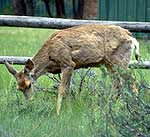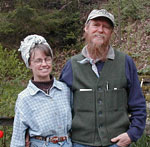By Erin Galbally
Minnesota Public Radio
May 30, 2002
Plans for a wide-scale deer hunt in southwestern Wisconsin are becoming complicated. Last winter, evidence of chronic wasting disease was found for the first time east of the Mississippi River. Portions of three Wisconsin counties are now designated hot-spot zones. The current plan calls for extermination of about 15,000 deer. he Wisconsin DNR is bowing to public concern, scaling back plans for a summer hunt. But local residents are still not satisfied.
| |
|
|
|
||
The Wisconsin DNR began issuing special hunting permits earlier this week. Landowners in a 359-square mile area can sign on to kill any deer found on their property. Earlier plans called for the hunt to continue throughout the summer. But now there will be four deer hunts from June through September - each one a week long.
Greg Mathews with the Wisconsin DNR says the agency changed the plan because of public pressure. He says the hunt can be safe, even though it's happening during peak tourist season.
"We're allowing these seven-day hunting periods - separated by three or four weeks with no hunting - to allow deer to settle down, and residents in the eradication zone to resume a normal life. (It) gives recreationists a sense of security," Mathews explains.
Mathews says the summer hunt was never intended to kill all the animals the DNR need to get. They're still looking to the traditional fall hunting season to do the bulk of the job.
Wildlife officials claim the special hunt is necessary to rid the state of chronic wasting disease. It's a fatal brain wasting illness related to mad cow disease.
Scientists are not sure just how the disease is transmitted, but state officials contend all of the animals in the region near Madison must be killed. If not, they warn, the disease could sweep the state and wipe out its entire white tail deer population.
There are already signs the disease has spread. A deer found just north of the affected counties recently tested positive. As a result, officials expanded the contamination zone.
Still the DNR's Greg Mathews believes chronic wasting disease is largely confined to the designated area.
| |
|
|
|
||
"It really...doesn't surprise us, because it's like a forest fire effect. You're going to have some sparks jump out of the fire," says Mathews. "In the whole big scheme of things, it's still confined to this area of southwestern Wisconsin."
But landowners in the area are still worried the state may be moving too fast. Many argue the DNR should proceed with more caution, because so little is known about the disease.
Even long-time hunters like Mark Kessenich have trouble with this deer kill. Kessenich says it's unlikely the meat can be harvested, which makes the hunts little more than wholesale slaughter. Kessenich owns a farm and bed and breakfast near Mount Horeb. That's where most of the 18 deer that tested positive were killed.
Kessenich is also a founding member of a group called Citizens Against Irrational Deer Slaughter. He says the group will likely take legal action this summer to stop the hunt.
"We made a decision not to stop the June hunt, but plan to be in court by the time of the July hunt - no, excuse me - before this killing starts," says Kessenich, purposely correcting himself. "We plan to seek an injunction before the July killing can transpire."
Kessenich says more and more people are coming out against the summer hunts. Reports the DNR plans to use helicopters and sharpshooters have only fueled concerns.
But even those plans have changed in recent days. A DNR spokesperson says the agency will only deploy sharpshooters at the request of landowners, and helicopters will be used sparingly in the fall. But that too could be subject to change.
More from MPRMore Information


